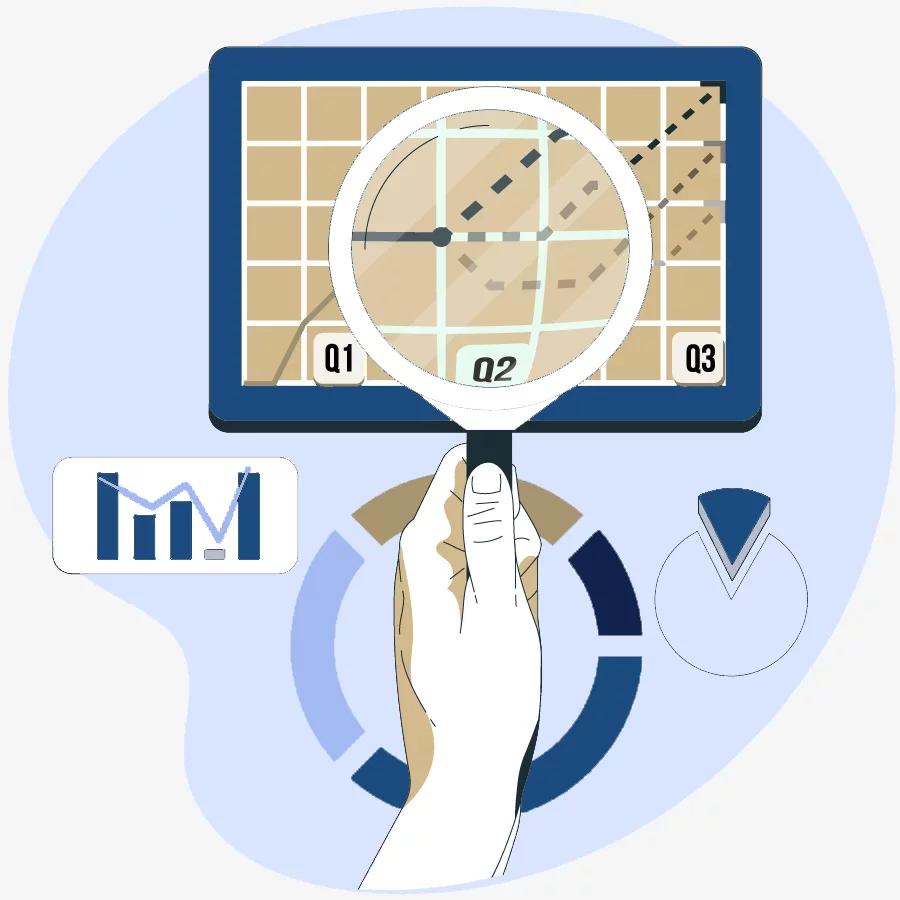Digital marketing strategy
Did you know that nearly half of all businesses still lack a clear digital marketing strategy? This means many brands are wasting time and resources without a defined direction. Digital marketing is more than just having a website or being active on social media it requires targeted and professional planning.
A digital strategy acts like a roadmap that helps you achieve business goals and outperform competitors by focusing your efforts and managing your budget more effectively. If you’re seeking real growth in the online marketplace, it’s time to build a professional digital marketing plan an essential step toward long-term success in the digital world.
Quick Access
Why Do You Need a Digital Marketing Strategy to Start?
In today’s online landscape, simply having a website or Instagram page isn’t enough. The competition grows tougher every day, and the digital market evolves quickly. That’s why a focused digital marketing strategy is no longer optional it’s essential.
There is no one size fits all strategy for all businesses, as user behavior and algorithms constantly change. Unfortunately, many companies still operate without a clear plan, often using scattered approaches that result in lost market share and missed opportunities.
Now is the time for your brand to develop a professional digital strategy. Investing in it lays the foundation for success and sustainable growth in the digital space.


The Role of Market Analysis in Digital Marketing Strategy
Market analysis is one of the most critical steps in developing a successful digital marketing strategy it acts like a compass that points your business in the right direction. At this stage, key data is gathered using specialized tools, including:
-
Audience behavior
-
Competitor performance
-
Brand strengths and weaknesses
-
Market trends
This data enables companies to make informed decisions, optimize resource allocation, and guide marketing activities toward the most impactful outcomes. The result? Greater audience engagement, improved user experience, increased sales and conversion rates, and stronger brand competitiveness in the digital space.
If you're aiming for long-term success online, market analysis isn't optional it's the defining difference between thriving brands and those that get lost in the digital noise.

Market Research in a Digital Marketing Strategy
As you build a smart digital marketing strategy, market research stands out as one of the most vital components. It involves collecting, analyzing, and interpreting relevant data to gain accurate insights into:
-
Customer behavior and needs
-
Competitor activity
-
Market trends
Through this process, you can clearly understand:
-
Who your real target audience is
-
How to communicate your message effectively
-
Which channels deliver the best results
Market research doesn’t just help attract the right audience; it also reveals hidden opportunities and allows you to make well informed, results driven decisions.

Setting Goals in a Digital Marketing Strategy
Setting goals is one of the first and most fundamental steps in creating a successful digital marketing strategy. Without clear goals, your marketing efforts can become scattered and ineffective.
The purpose of goal setting is to define exactly what you want to achieve. Are you looking to:
-
Increase sales
-
Generate more leads
-
Build stronger brand awareness
Each goal demands its own path, tools, and methods. When goals are clearly defined specific, measurable, and realistic you benefit from:
-
Easier performance evaluation
-
Clear identification of strengths and weaknesses
-
The ability to adjust and improve your strategy when needed
In short, smart goal-setting helps you keep your marketing efforts focused, consistent, and results oriented. If you’re aiming for real success in the digital world, start here: set clear and strategic goals.

Defining the Target Audience in a Digital Marketing Strategy
Identifying your target audience is both one of the most basic and most crucial steps in developing a digital marketing strategy. When you truly understand your audience’s needs, concerns, and behaviors, you can tailor your content, products, and services more intelligently and effectively.
Several methods can help you define your audience accurately:
-
Conducting market research and competitor analysis
-
Using surveys, interviews, and questionnaires
-
Analyzing behavioral data via analytics and SEO tools
-
Creating buyer personas and clearly defining segments
-
Mapping the customer journey and developing a marketing plan
By using these methods, you gain deep insight into your audience and can execute a digital marketing strategy built on real, reliable data.

Content Strategy in Digital Marketing
Content strategy is a vital component of digital marketing. It involves planning, creating, and managing content that aligns with audience needs, behaviors, and the brand’s objectives.
Key elements of a content strategy include:
-
Introducing the brand and defining goals
-
Identifying the target audience
-
Analyzing competitors
-
Setting performance indicators
-
Developing a content calendar
-
Defining brand tone and voice
-
Establishing content creation guidelines and boundaries
-
Building a content team
A well crafted and targeted content strategy enhances brand credibility, attracts the right audience, and drives sales.

Channel Strategy in Digital Marketing
Channel strategy in digital marketing refers to selecting and managing the platforms through which your brand's message and content are delivered to your audience. This strategy determines which platforms to use and how to maximize their effectiveness.
The main digital marketing channels include:
-
Search engines (SEO and SEM)
-
Social media networks
-
Email marketing
-
SMS and messaging apps
Choosing the right channels depends on several factors, such as your business type, audience characteristics, budget, team capacity, and competitor analysis. A well defined channel strategy helps you reduce costs and increase the effectiveness of your campaigns.

Advertising Strategy in a Digital Marketing Plan
An advertising strategy is a key part of your digital marketing plan. It focuses on attracting your target audience through online channels and guiding them toward a specific action (e.g., purchase, registration, or contact).
Steps to build an effective advertising strategy include:
-
Identify your audience persona and their needs
-
Define advertising goals and performance metrics
-
Choose the most relevant advertising channels
-
Allocate budget per channel and monitor ROI (Return on Investment)
-
Produce platform-appropriate content tailored to the target audience
-
Launch campaigns and monitor performance for continuous optimization
A strong advertising strategy ensures that the right message reaches the right audience, on the right platform, at the right time boosting engagement and conversions.

Measuring and Improving Performance in Digital Marketing
Measuring performance and continuous improvement are core pillars of a successful digital marketing strategy. It’s crucial to use accurate tools and indicators to track progress and make data-driven decisions.
Key tools and metrics include:
-
Google Analytics: A powerful tool for analyzing user behavior on your website
-
KPIs (Key Performance Indicators): Metrics that track how well you're achieving your marketing goals
By regularly analyzing this data, you can refine campaigns, fix weaknesses, and seize new opportunities. Accurate measurement not only improves strategy but also significantly increases cost efficiency.

Benefits of an Effective Digital Marketing Strategy
A strong, cohesive digital marketing strategy delivers significant benefits, such as:
-
Targeted Audience Reach: Engage directly with people who are already interested in your brand
-
Cost Reduction & Higher ROI: Use affordable and measurable tools compared to traditional marketing
-
Increased Brand Awareness & Trust: Valuable content and consistent digital presence make your brand a trusted resource
-
Ongoing Customer Engagement: Maintain strong relationships through social media, email, and other channels
-
High Flexibility: Quickly adapt to market changes and shifts in user behavior
Ultimately, an effective digital marketing strategy paves the way for growth, profitability, and a strong brand position in today’s competitive online landscape.

Steps to Designing a Digital Marketing Strategy
1
Create a Target Audience Persona
Identify your ideal customers’ needs, behaviors, and preferred channels. Understanding your audience ensures your strategy is relevant and effective.
2
Set Goals and Allocate Resources
Define clear SMART goals (Specific, Measurable, Achievable, Relevant, Time-bound). Establish your budget, timeline, and methods for measuring results.
3
Choose Digital Channels
Select the most effective platforms to attract, engage, convert, and retain your audience—whether it's social media, search engines, email, or others.
4
Plan Content Production
Determine the content types, formats, tone, and language best suited to your audience and goals. Align your content calendar with campaign objectives.
5
Review and Analyze Performance
Use analytics tools to measure channel and campaign effectiveness. Evaluate metrics like traffic, engagement, conversions, and ROI.
6
Develop and Optimize the Strategy
Build an actionable plan that includes team roles, budget allocation, timelines, and a feedback loop for continuous improvement and growth.
Related projects
Answers to your possible questions
How much should we spend to achieve our goals?
It depends on the type of business you have, your product or service, and your specific objectives whether it's brand awareness, lead generation, or sales. We recommend scheduling a free consultation with our team so we can provide a customized budget plan based on your unique needs.
How effective is digital marketing compared to traditional marketing?
The greatest advantage of digital marketing is that it is measurable and data-driven. You can track results such as clicks, conversions, reach, and return on investment (ROI) with precision. While the effectiveness of traditional marketing (e.g., TV, radio, print) continues to decline, digital marketing offers greater accuracy, flexibility, and cost-efficiency.
Is having a website necessary for online marketing?
Yes, having a website is the first essential step in any online marketing strategy. It serves as your brand’s digital home, builds credibility, and acts as the foundation for all your online campaigns and customer interactions.



Add a comment
Your email address will not be published. Required fields are marked.